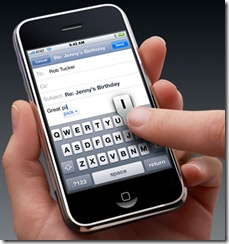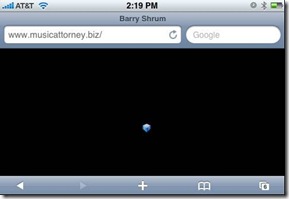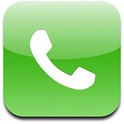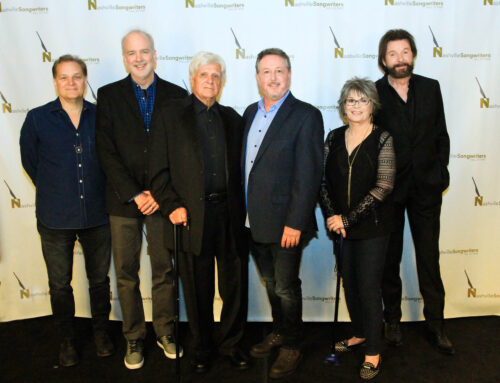Once upon a time, there was a shinny new device called the iPhone that tried to climb up the mammoth hill that is the sole domain of the business smartphone. “I think I can, I think I can,” said the iPhone, and it tried and it tried, but alas, it could only make it up about half way, and then it sputtered and. . . . The end of this story cannot be written.
Obviously, you probably figured out by now that I have fallen victim to the allure driven by the site of all of my business associates who were sporting shiny black and white, Zen-like devices with colorful icons. Yes, I bought an iPhone. And while this article may be a bit off topic for my music business oriented blog, anyone who knows me knows that I am a techie through and through and enjoy new gadgets and technologies more than most. Many of my friends call me the guru for good reason. So, here goes.
As a long time fan of Palm, you might wonder why I did not wait for the premier of the Palm Pre. The simple reason is that Sprint service does not reach to my residential area. That was also the reason that, in recent years, I migrated to Windows Mobile, which I grew to love almost as much as the Palm OS. However, finally I was convinced to switch to the dark side and try it with Apple.
My relationship with my iPhone is what I describe as a “love hate” relationship. Yes, there are many many things I really love about the iPhone. I love the way it feels in your hand, almost like a smooth pebble plucked from a lake in the mountains of Japan. As I said in the story above, very “Zen-like.” After all, that is the Apple way isn’t it?
 At first I thought the soft keyboard would drive me crazy. Surprisingly, I’m getting used to it and pretty efficient, although I still maintain that a hardware keyboard is much more efficient – something the Palm Pre does beautifully.
At first I thought the soft keyboard would drive me crazy. Surprisingly, I’m getting used to it and pretty efficient, although I still maintain that a hardware keyboard is much more efficient – something the Palm Pre does beautifully.
For the most part, on the positive side, I really love the web browsing experience. The websites that actually work (more on this later) come up beautifully and quickly. And, as a tech person, I really like the fact that there are scores of programmers writting countless applications for the iPhone. For the most part, the marketing is true, “there is an app for that.” That’s sort of where the “hate” part of the relationship begins, in that shaded area between the “for the most part” and the remaining part of 100%! That’s the part that keeps the iPhone from being a full-fledged business phone.
Recently, Apple has been pushing the idea that the iPhone is the ideal phone for business. There are several flaws with the iPhone which, until remedied, will prevent its widespread infiltration into the lockhold that BlackBerry, Palm and Windows Mobile have on that sector of the market.
So, what I’d like to address in this article is not the scores of more obvious deficiencies that have already been pointed out in the blogs and articles – no native voice dial, lack of full support for Bluetooth, no memory expansion, no cut and paste, no MMS, intolerable battery life, etc. – but the less obvious and definitely serious deficiencies that relate more specifically to a business person’s daily use of a smartphone.
First and foremost, and this has certainly been recognized by others, is the lack of support for Javascript and Flash plug-ins in the built-in Safari browser. If your websites relies on either of these, as my www.musicattorney.biz does, then what the iPhone visitor will see is a blue Lego-style brick with a question mark in the middle (see the illustration). What the hell is  that? Unforgiveable, that’s what it is. There’s no other word for it. And all simply because Apple doesn’t like to play nice with its competitors, particularly Adobe. Shame on you Jobs.
that? Unforgiveable, that’s what it is. There’s no other word for it. And all simply because Apple doesn’t like to play nice with its competitors, particularly Adobe. Shame on you Jobs.
Secondly, and this has always been one of my major beefs with Apple, the proprietary, i.e. closed, operating system. Apple’s SDK, as one developer put it, “has more restrictions than Guantanamo.” Developers require a certain level of integration with the OS in order to develop business-class applications to work around the inherent deficiencies in the native iPhone software. But no – Apple is too proprietary for that. This needs to change and quickly.
One perfect example of this is the calendar. For some unknown reason, there is NO WEEK VIEW in the calendar. No week view? I don’t know about most business people, but for me, the week view is the “go-to” view of choice. Yes, I know, there is a “list” view on the iPhone, but it’s not nearly the same thing. To witness the difference for yourself, download the iPhone version of an old Windows Mobile classic, Pocket Informant and look at the week view in that software. Ah, problem solved you might be thinking. Just use the App! Not so quickly: Pocket Informant ONLY syncs with a Google calendar account. Why, you ask? That’s right, because Apple will not allow the programmers to access the base-level calendar on the iPhone and therefore the information in the iPhone’s calendar CANNOT be displayed in beautiful week view of Pocket Informant. Yes, the week view is sort of a sore spot for me. But is iconic, if you’ll allow me the pun, of the fallacy of the proprietary restraints Apple places on programmers. There is absolutely no excuse.
 While we’re on the subject of little annoyances, what’s up with dialing the damn iPhone? There is no quick way to get to the dial pad. Duh!!! It is, first and foremost, supposed to be A PHONE. Give us a quick way to access the dial pad! When you press the pretty green telephone icon, you land on whatever segment of the program you happened to be on when you last opened it, whether it be voicemail or recent contacts. You MIGHT get lucky and land on the dial pad. But there’s a one in four shot that you have to press yet another icon to get to the dial pad to, dare I say it, actually make a phone call. IT’S A PHONE!!!!
While we’re on the subject of little annoyances, what’s up with dialing the damn iPhone? There is no quick way to get to the dial pad. Duh!!! It is, first and foremost, supposed to be A PHONE. Give us a quick way to access the dial pad! When you press the pretty green telephone icon, you land on whatever segment of the program you happened to be on when you last opened it, whether it be voicemail or recent contacts. You MIGHT get lucky and land on the dial pad. But there’s a one in four shot that you have to press yet another icon to get to the dial pad to, dare I say it, actually make a phone call. IT’S A PHONE!!!!
Since we’re on the subject, looking up contacts is probably a breeze for some MP3 stealing teenager with 25-50 contacts in their address book. When they swipe their pimple-popping finger down the list I’m sure it flows beautifully for them. I, on the other hand, like many other business people, have close to 2000 contacts in my database: not the same “weeeee” experience with the finger-scrolling thingy! There is simply no good way, on the native applications, to search for a contact and quickly dial them. Fortunately, in this instance, there are severa
l app for that developed by people who recognized this deficiency.
Now, getting back to the primary focus of the article, the third annoyance that prevents the iPhone from being a major contender in the business market is the lack of multitasking. That’s right, multitasking. The Palm Pre recognizes and addresses this need beautifully, as does the Blackberry Storm. Both have methods by which you can easily and quickly switch between open programs seamlessly. Not the iPhone. With the iPhone, you must always return to the home screen in order to open a program (if you’re lucky enough to find it on the home screen).
The home screen is designed, once again, for the casual and, dare I say it, younger user. Each program is represented by a cute, colorful icon with neatly rounded edges. Did I say cute? The icon concept works great if you have only a few applications, but if you start to actually utilize the “there’s an app for that” concept and download more than a few pages worth of applications, you soon find that it’s difficult to locate the app you’re look for in any given moment (As an aside, you’ll ![]() also find that you are limited to the number of applications you install on the iPhone – nine screens of 16 +4, i.e., 148 applications!). Apple has some smart programmers, why not throw in some “categories” or “tabs” or some intelligent organizational method to use in sorting and filing the icons in manageable clusters?! But no, that’s a little to complex for an Apple, I suppose – there’s absolutely NO file or icon management whatsoever.
also find that you are limited to the number of applications you install on the iPhone – nine screens of 16 +4, i.e., 148 applications!). Apple has some smart programmers, why not throw in some “categories” or “tabs” or some intelligent organizational method to use in sorting and filing the icons in manageable clusters?! But no, that’s a little to complex for an Apple, I suppose – there’s absolutely NO file or icon management whatsoever.
While we’re on the subject of wish lists and multitasking, why not allow me to have a “back” button that returns me to my previous program. But no, if I want to look up someone’s phone number or address to include in a calendar event, for example, I have to hit the home key, thereby exiting the calendar, go find the contacts icon, press it, scroll through scores of contacts until I find the right one, then select that contact, memorize the information, exit the contacts program, find the calendar icon, press the calendar icon – OH MY FREEEEEKING *#*#*#!!!!!! Isn’t Apple supposed to be the king of simplicity? Somebody surely missed the boat on this one didn’t they? It IS a simple concept – multitasking. Apple didn’t get it. Multitasking is one of the things that all successful business people have in common.
So, you might be wondering, if I am doing all this complaining, why do I still have and use the iPhone. Well, actually as I said, there are many apps that do service many of my needs – an many that work around some of these issues. For example, I utilize Freshbooks for invoicing with its iPhone app, I use SugarSync for file backup and access it with its iPhone app, I use Jott for dictating quick notes to myself and clients and it has a neat iPhone app, I use eReader for my literary needs, Transactions to get myself paid, Pandora to listen to music, Upvise for my shopping list needs, ReQall for my localized to do list, MyCast for weather, and My Banking online, etc. etc. You get the picture. There are still many programs that fill many of my business needs.
Oh, don’t get me wrong: I could do ALL of these things on my old Samsung Blackjack with Windows Mobile. But certainly the iPhone is, after all, the most recent iconic symbol of high technology and that is, after all, why I ultimately ended up with the iPhone. And it does perform beautifully.
I just hope that Apple has their act together enough to realize that their market is expanding, and in order to expand fully into the business sector, it might have to let go of some of its old methods of doing things. Let the programmers in. Let them design fixes to these flaws. Let them develop an app for that! Until then, in my opinion, the Blackberry Storms and Samsung Jacks of the world will continue to have a foothold in that precious business market that every smartphone desires to dominate. Until then, Apple, repeat after me: “I think I can, I think I can . . . .”





